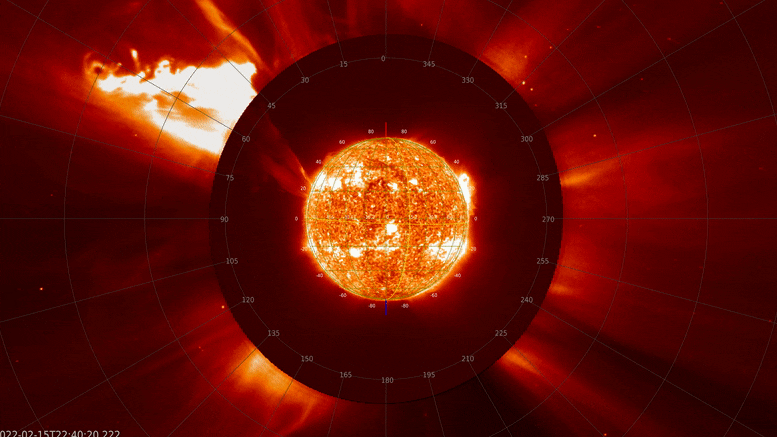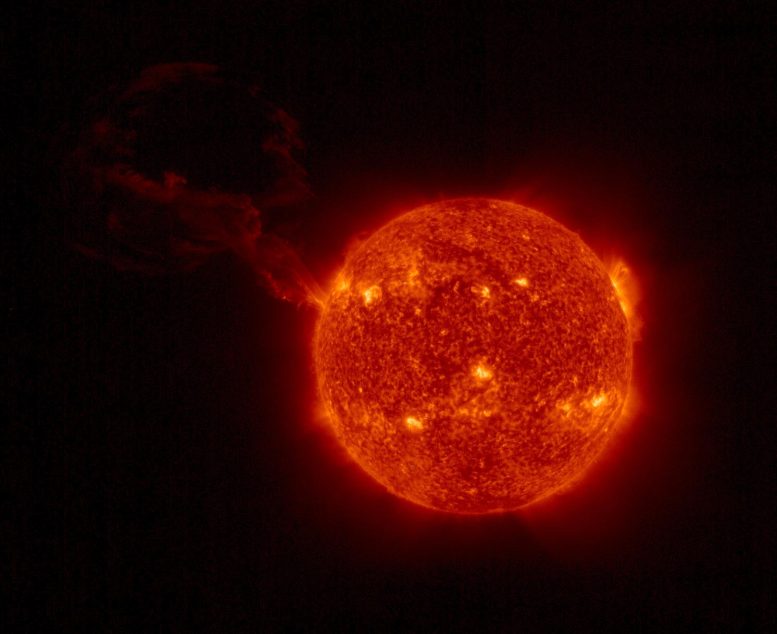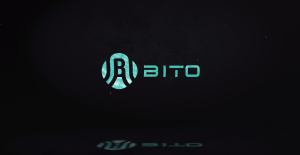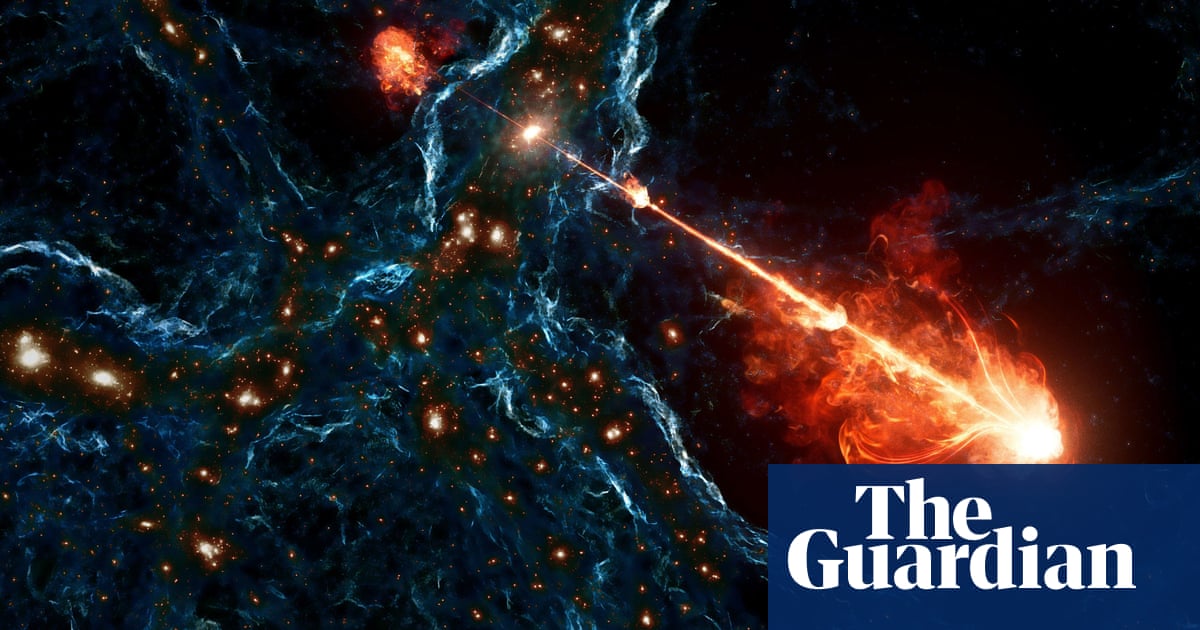
거대 분출의 태양 궤도선과 소호의 모습 – 클로즈업. 출처: Solar Orbiter Team / EUI, SOHO / LASCO, ESA 및 NASA
유럽 우주국 /[{” attribute=””>NASA Solar Orbiter spacecraft has captured the largest solar prominence eruption ever observed in a single image together with the full solar disc.
Solar prominences are large structures of tangled magnetic field lines that keep dense concentrations of solar plasma suspended above the Sun’s surface, sometimes taking the form of arching loops. They are often associated with coronal mass ejections, which if directed towards Earth, can wreak havoc with our technology and everyday lives.
이 마지막 사건은 2022년 2월 15일에 발생했으며 수백만 킬로미터를 우주로 확장했습니다. 코로나 질량 방출은 지구를 향하지 않았습니다. 사실, 그것은 우리에게서 멀어지고 있습니다. 현재 지구와 태양의 선에 접근하고 있는 우주선을 향하고 있는 태양 디스크에는 분화의 흔적이 없습니다.

ESA/NASA Solar Orbiter 우주선에 실린 Full Sun Imager의 Extreme Ultraviolet Imager 이미지는 2022년 2월 15일에 거대한 태양 폭발을 포착했습니다. 태양 돌출부는 표면 위에 부유하는 태양 플라즈마의 조밀한 농도를 유지하는 서로 맞물리는 자기장 라인으로 만들어진 큰 구조입니다. . 태양의 표면은 종종 아치형 고리의 형태를 취합니다. 이것은 전체 태양 디스크가있는 단일 이미지에서 관찰 된 가장 큰 주목할만한 태양 폭발입니다. 출처: Solar Orbiter/EUI 팀/유럽 우주국 및 NASA
사진은 .의 “Full Sun Imager”(FSI)에서 촬영했습니다. 극한의 UV 이미징 (EUI) 태양 궤도선. FSI는 다음 달에 다가올 근일점 회랑과 같이 태양에 가까이 가는 동안에도 전체 태양 디스크를 보도록 설계되었습니다. 우주선이 태양과 지구 거리의 0.3배 이내로 통과하는 3월 26일에 가장 가까운 접근에서 태양은 망원경 시야의 훨씬 더 많은 부분을 채울 것입니다. 현재 디스크 주변에는 여전히 많은 “너비 여유”가 있어 FSI가 태양 반경의 5배인 약 350만km에 대해 놀라운 세부 정보를 캡처할 수 있습니다.
다음과 같은 다른 우주 망원경 ESA/NASA SOHO 위성 이와 같은 태양 활동을 종종 볼 수 있지만 태양에 더 가깝거나 막에 의해 더 멀리 떨어져 있습니다. 이 막은 태양 디스크의 눈부심을 차단하여 코로나 자체의 상세한 이미지를 가능하게 합니다. 따라서 Solar Orbiter가 관측한 현저성은 태양 원반과 함께 단일 시야에서 포착된 가장 큰 사건이며, 이러한 사건이 처음으로 태양 원반과 관련되는 방식을 배울 수 있는 새로운 가능성을 열어줍니다. 동시에, 소호 더 먼 거리에 대한 보완적인 뷰를 제공할 수 있습니다.
NASA의 Parker Solar Probe를 포함하여 이벤트를 관찰하는 다른 우주 임무도 있었습니다. 다음 주에 Solar Orbiter와 Parker Solar Probe는 Parker의 근일점을 통과하는 동안 공동 맞춤형 관측을 수행할 것입니다.
태양과학에 전념하지 않는 우주선도 폭발을 느꼈다 – 유럽우주국 /[{” attribute=””>JAXA BepiColombo mission, currently in the vicinity of Mercury’s orbit – detected a massive increase in the readings for electrons, protons, and heavy ions with its radiation monitor.
And while this event did not send a blast of deadly particles towards Earth, it is an important reminder of the unpredictable nature of the Sun and the importance of understanding and monitoring its behavior. Together with ESA’s future dedicated space weather mission Vigil, which will provide unique views of events like these, we can better protect our home planet from the Sun’s violent outbursts.

“음악 팬. 매우 겸손한 탐험가. 분석가. 여행 괴짜. 익스트림 TV 전문가. 게이머.”









